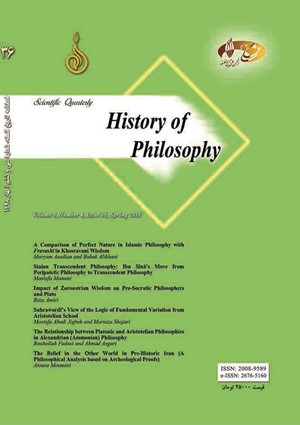The Relationship between Platonic and Aristotelian Philosophies in Alexandrian (Ammonian) Philosophy
Subject Areas : اندیشههای حکمی و فلسفی ایران باستانRoohollah Fadaei 1 * , Ahmad Asgari 2
1 - Tarbiat Modares University
2 -
Keywords: Plato Aristotle Alexandrian school Ammonius ,
Abstract :
Since the first century BC, Platonic philosophy has always been in conflict with Peripatetic philosophy. Here, the main trend which tried to reconcile these two schools with each other reached its culmination in Ammonius Saccas’ philosophy. The same idea was fully realized in Porphyry’s school, following which Platonic philosophers devoted particular attention to reconciling the views of Plato and Aristotle. However, Sureyanus and Proclus did not agree with this trend and criticized Aristotle with respect to some important issues. They also maintained that some of his views were in contrast to those of Plato. According to Proclus, Aristotle had denied the world of Ideas and had failed to grasp the concept of the Divine efficient cause, thus limiting His agency to the final cause. He also maintained that Aristotle had promoted the intellect to the level of the first origin and absolute one, which was by itself an unforgivable mistake and diversion. In contrast, in the light of the efforts made by Ammonius Hermiae and his students, the Alexandrian School of Philosophy was developed. This School aimed to reconcile the philosophical Schools of Plato and Aristotle with each other following a systematic process and, finally, managed to do so in the best way possible. As one of the most prominent philosophers of this field, Simplicus, under the influence of Ammonius Hermiae, interpreted what Proclus deemed as the points of departure between the views of Aristotle and Plato in a way that they turned into their points of agreement. He did this not because of his personal preferences but due to the existing philosophical necessities.
Alcinoos (1990) Enseignement des doctrines de Platon, Pierre Louis, Paris: Les Belles Lettres.
Alcinoos (1993) The Hand Book of Platonism, Trans. by John Dillon, Oxford University Press.
Ammonius (1991) On Aristotle's Categories, S. M. Cohen, & G. B. Matthews, Trans, New York: Cornell University Press.
Aristotle (1831) Aristoteles Graece, Immanuelis Bekkeri (ed.), Berolini: Apud Georgium Reimerum.
Aristotle (1984) The Complete Works of Aristotle, J. Barnes (ed)., New Jersey: Princeton University Press
Blank, D. (2010) “Ammonius Hermeiou and His School”, in L. Gerson (ed.), The Cambridge History of Philosophy in Late Antiquity, Vol. 2, New York: Cambridge University Press.
Chiaradonna, R. (2016) “Porphyry and the Aristotelian Tradition”, in A. Falcon (ed.), Brill’s Companion to the Reception of Aristotle in Antiquity, Leiden: Brill.
D'Hoine, P. (2016) “Syrianus and Proclus on Aristotle”, in A. Falcon (ed.), Brill’s Companion to the Reception of Aristotle in Antiquity, Leiden: Brill.
Golitsis, P. (2016) “Simplicius and Philoponus on the Authority of Aristotle”, In A. Falcon (ed.), Brill’s Companion to the Reception of Aristotle in Antiquity, Leiden: Brill.
Griffin, M. (2016) “Ammonius and the Alexandrian School” in A. Falcon (ed.), Brill’s Companion to the Reception of Aristotle in Antiquity, Leiden: Brill.
Hadot, I. (2015) Athenian and Alexandrian Neoplatonism and the Harmonization of Aristotle and Plato, trans.by M. Chase. Leiden: Brill.
Lloyd, A. C. (2007) The Later Neoplatonists, in A. H. Armstrong (ed.), The Cambridge History of Later Greek and Early Medieval Philosophy, Cambridge University Press.
Menn, S. (2012) “Self-Motion and Reflection: Hermias and Proclus on the Harmony of Plato and Aristotle on the Soul”, in J. Wilberding and Christoph Horn (eds.) Neoplatonism and the Philosophy of Nature, University Press Oxford.
Michalewski, A. (2016) “The Reception of Aristotle in Middle Platonism: From Eudorus of Alexandria to Ammonius Saccas”, in A. Falcon (ed.), Brill’s Companion to the Reception of Aristotle in Antiquity, Leiden: Brill.
Olympiodorus, (1998) Commentary on Plato’s Gorgias, trans. by R. Jackson, K. Lycos, & H. Tarrant, Leiden: Brill.
Opsomer, Jan (2016) “An Intellective Perspective on Aristotle: Iamblichus the Divine”, in A. Falcon (ed.), Brill’s Companion to the Reception of Aristotle in Antiquity, Leiden: Brill.
Plato, (1997) Complete Works, John M. Cooper, (ed)., Indianapolis: Hackett Publishing Company.
Plotinus, (1988) Plotinus: Volume VI, Ennead VI.1-5., trans. by A. H. Armstrong, London: Harvard University Press.
Porphyry, (2014) On Aristotle Categories, trans. by S. K. Strange, Bloomsbury.
Proclus, (1963) The Elements of Theology, trans. by E. R. Dodds, London: Oxford.
Proclus (1987) Commentary on Plato’s Parmenides, translated by Glenn R. Morrow & John Dillon, with introduction and notes by John Dillon, Princeton University Press.
Proclus (2007) Commentary on Plato's Timaeus: Volume 3, Book 3, Part 1: Proclus on the World’s Body, translated with an introduction and notes by Dirk Baltzly, Cambridge University Press.
Proclus (2008) Commentary on Plato’s Timaeus: Volume 2, Book 2: Proclus on the Causes of the Cosmos and its Creation, trans. by D. T. Runia, & M. Share, New York: Cambridge University Press.
Simplicius (2001a) On Aristotle Categories 5-6., trans. by F. de Hass, & B. Fleet, Great Britain: Bloomsbury.
Simplicius (2001b) Simplicius: On Aristotle Physics 8.6-10, trans. by R. D. McKirahan, Great Britain: Bloomsbury.
Simplicius (2003) On Aristotle’s “Categories 1-4”, trans. by M. Chase, New York: Cornell University Press.
Simplicius (2005) On Aristotle On the Heavens 2.10-14, trans. by I. Mueller, Trans, Great Britain: Bloomsbury.
Simplicius (2014) Simplicius: On Aristotle On the Heavens 2.1-9., I. Mueller, Trans. by Great Britain: Bloomsbury.
Sorabji, R. (2016) “Introduction”, in R. Sorabji (ed.), Aristotle Re-Interpreted: New Findings on Seven Hundred Years of the Ancient Commentators, New York, Bloomsbury.
Verrycken, K. (2016) “The Metaphysics of Ammonius Son of Hermias”, in R. Sorabji (ed.), Aristotle Transformed: The Ancient Commentators and Their Influence, New York: Bloomsbury.
Wisnovsky, R. (2003) Avicenna’s Metaphysics in Context, Great Britain: Cornell University Press.

